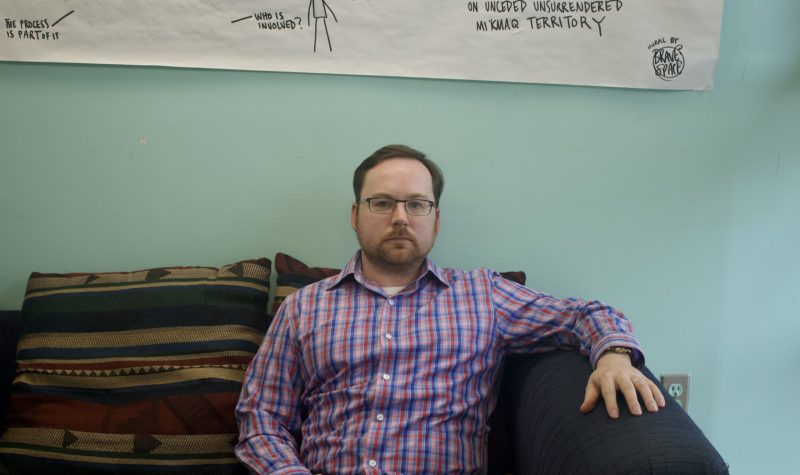A Dalhousie University researcher published his findings from his two-year research into the world of misogynistic incels, an online community deeply rooted in ideas of hatred toward women who view themselves as victims, this month.
Assistant professor in the department of sociology and social anthropology at Dalhousie University, Michael Halpin accessed an online incel discussion board on the internet and analyzed more than 25,000 of their comments through threads to evaluate how they talk about women, technology, society, violence, self-harm and other things. The term "incel" is derived from the words "involuntary" and "celibate."
"Involuntary celibates or in cells are a predominantly online community of heterosexual men that are very angry and aggrieved by their inability to form heterosexual sexual relationships and romantic relationships. We are doing quantitative and qualitative analysis of incel communities. So we go on to their discussion boards, we read in detail all the things that they're saying, we also download everything, and analyze it using approaches from computer science," said Halpin.
Halpin's finding concluded that men on the discussion board blamed their involuntary celibate status on new forms of technology, other men, and, mainly, women.
"They're an extremely misogynistic community. They talk about hurting women, stalking women, harassing women and working towards eliminating all of women's human rights.
Halpin said it's easy to access and join incel websites, which are similar to discussion boards and get millions of monthly visitors through.
"If you want to participate, you have to have a username and password, but it's very easy to find and very easy to participate."
He said incels blame social media sites such as Instagram and Tinder for inflating women's egos.
"For Instagram, it inflates women's perception of how attractive they are and makes women who were of average attractiveness think that they should be partnered with extremely attractive men like Chris Hemsworth. With Tinder, they see it as providing a skewed dating market for extremely attractive men," said Halpin, discussing the ideas he observed.
According to incels' beliefs, those two things mean that women are overwhelmingly focusing on attractive men and men who were average attractiveness and definitely below attractiveness are relegated to being incels.
Incels also use a common type of jargon, based on race, gender and sexual attractiveness, a common one refers to women and men as "Stacys" and "Chads," respectively.
"Chads are the most attractive white men so they're at the pinnacle of society. Stacy is less insulting than many of the other terms they use for women, but I want to emphasize it's meant to be derogatory. They're talking about these women, as though they're kind of mean, spiteful bimbos," explained Halpin.
Halpin discovered new information in his research, such as the low self esteem they have regarding their image and ideas of misogyny and lookism.
"Lookism is a form of prejudice and bias in the favor of attractive people which incels see structuring society, but it is also a real thing. Of course, there's bias in favor of attractiveness. So (the research) interesting discussions on their typology, and their unique views on the social world," he said.
He explained his research revealed that many incels in online communities view their bodies in denigrating ways, are depressed and have disorders such as body dysmorphoria.
They celebrated Roe. v Wade getting overturned in the United States, not because they are pro choice, but because they view that decision as harming women, he observed.
Incels from the online community can be a danger to their communities in several ways. First, they can take actions in form of regularly harassing, stalking or assaulting women in online spaces.
"They're part of that community that makes online spaces generally toxic for women and in many ways, the amount of hate tweets and hate comments and hate emails that women get is partly produced by this community."
Second, they can be tied to acts of violence. Elliot Rodger from the United States, was celebrated by the incel community. He killed six people in a stabbing and shooting spree in California in May 2014. In Canada, Alec Minassian, who identified as a member of the online incel community, was found guilty after using a rental van to kill ten people and injure 16 on a busy sidewalk in Toronto in 2018.
"They celebrate those people, they refer to them as saints or martyrs. They wish that they killed more people, and hope to see other mass murders happen in the future," Halpin said. "They celebrate people like Marc Lapin, who took who had a very specifically misogynistic anti-woman assault, they claim him as a member of the community and celebrate him referring to him as a saint."
In terms of the police keeping track of these online communities, Halpin said that Canada is leading the way in terms of seeing incel communities related to the criminal justice system.
"The reason that Canada is leading the way on that is that they have begun to define incels as a domestic terror or terror ideology in a way that would facilitate future police action against the community. It is very difficult, of course, because they're distributed, online, and semi-anonymous."
At the same time, what is noticeable throughout these chatrooms are the violations of hate speech, their celebration of violence and their support for any policies that undermine or harm women.
In terms of finding solutions to cracking down on harmful online incel communities, Halpin said it would require a multi-prolonged approach.
Some of his suggested methods are to raise public awareness about this community by educating people about some of online incels signs and jargon. He also suggests adapting existing tools that deal with misinformation to engage with the community such as using fact-check tools to identify fake news.
Michael Halpin's research paper 'Weaponized Subordination: How Incels Discredit Themselves to Degrade Women' was published Oct. 5 and can be accessed online in the journal Psychology of Men and Masculinities and on his website.


